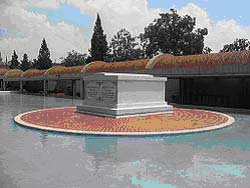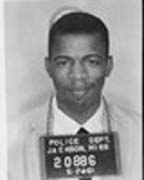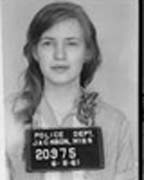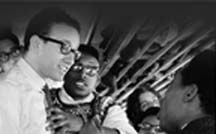
 Attempting to block integration at the U. of Alabama, Gov.George Wallace stands defiantly at the door while being confronted by Deputy U.S. Attorney General Nicholas Katzenbach. |
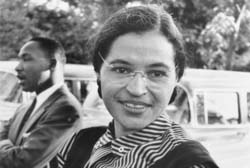 Montgomery Bus Boycott |
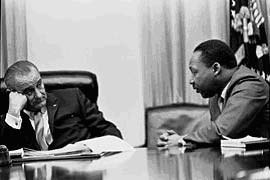 Meeting With The President
|
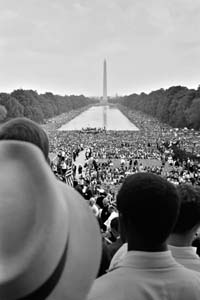 1963 March on Washington
|
Martin Luther King, Jr.January 15, 1929 �April 4, 1968 Orator � Civil Rights Activist - Clergyman
Orator � Civil Rights Activist - Clergyman
INTRODUCTIONMKL was the foremost leader in the African-American Civil Rights Movement. He is known for the implementing of non-violent means in advancing civil rights. King became a civil rights activist early in his ministry. He was a major participant in the 1955 Montgomery Bus Boycott. He help founded the Southern Christian Leadership Conference (SCLC) in 1957 and became its first president. Not all of his desegregation efforts were successful including the struggle in Albany, Georgia in 1962. However, the nonviolent protest in Birmingham, Alabama showed brutal violence administered by the police against a nonviolent marchers. This was shown on nationwide television and got the attention and the support of the nation and more success would follow. King helped to organize the 1963 March on Washington. Here he delivered his �I Have a Dream� speech. This speech showed him to be one of the greatest speakers in American history. His efforts made him an object of the Federal Bureau of Investigation ( FBI) for the rest of his life. The FBI recorded him having extramarital relations and reported them to government officials. They also threatened him with an anonymous letter that they thought would force him to suicide. King received the Nobel Peace Prize in 1964 for his fight against racial inequality using nonviolence as its means. He and SCLC helped in the organizing of the Selma to Montgomery marches. Not being content to only work in the south he took his movement to Chicago. He not only worked for civil rights, he focused on poverty in America and showed great opposition to the Vietnam War. The latter was opposed by many of his liberial friends. He was assasinated on April 4, 1968 in Memphis, Tennessee. Following his death thousands took to the streets of America in a rampage of violence. Allegations were pointed at James Earl Ray as being the only person involved in the killing. Decades later another man, Loyd Jowers, was found to be complicit in the conspiracy against King. King has received many posthumously honors. Some which are the Presidential Medal of Freedom in 1977 and the Congressional Gold Medal in 2004. A federal holiday was established in his name in 1986. Hundreds of streets in the country have been renamed in his honor. Also a memorial statue now sits in Washington, D.C. on the mall.
EARLY LIFEMartin Luther King, Jr. was born to Reverend Martin Luther King, Sr. and Alberta Williams King on January 15 1929 in Atlanta, Georgia. Martin was a free thinker at an early age. This is shown by the fact that he questioned some portion of the Bible. In particular was his initial denial of the �bodily resurrection of Jesus, at age thirteen. However he later concluded that the Bible possessed �many profound truths which one cannot escape.� Being a very intelligent boy he skipped the ninth and twelfth grade and entered Morehouse College. He graduated from Morehouse in 1948 with a Bachelor of Arts degree in sociology. He then enrolled in Crozer Theological Seminary in Chester Pennsylvania. He graduated from Crozer with a Bachelor of Divinity degree in 1951. Martin and Coretta Scott married on June 18, 1953. The marriage yielded four children. King became the pastor of Dexter Avenue Baptist Church in Montgomery, Alabama at the age of twenty-five. Following which he began doctoral studies in systematic theology at Boston University. He graduated with a Ph.D. on June 5, 1955. His dissertation was on �A Comparison of the Conceptions of God in the thinking of Paul Tillich and Henry Nelson Wieman.�
NON VIOLENCEWith inspiration drawn from Gandhi and assistance from the Quaker group, the �American Friends Service Committee," Martin visited Gandhi�s place of birth in India in 1959. He was profoundly affected by the trip. It deepened his understanding of non-violent resistance. He decided to use non-violent means in an effort to promote civil rights for Black Americans. In a radio broadcast made during the final evening of his stay in India Martin said: �Since being in India, I am more convinced than ever before that the method of nonviolent resistance is the most potent weapon available to oppressed people in their struggle for justice and human dignity. In a real sense, Mahatma Gandhi embodied in his life certain universal principles that are inherent in the moral structure of the universe, and these principles are as inescapable as the law of gravitation.� Bayard Rustin had studied the teachings of Mahatma Gandhi�s and consoled Martin in Gandhi�s principles throughout his early activism. Rustin worked well with King. He was the main organizer of the 1963 March on Washington.
POLITICSOn politics King choose to be neutral. He wished not to support any political party or candidate: �I feel someone must remain in the position of non-alignment, so that he can look objectively at both parties and be the conscience of both�not the servant or master of either.� He stressed his view that both neither of the parties was perfect, he said: �I don�t think the Republican Party is a party full of the almighty God nor is the Democratic Party. They both have weaknesses�And I�m not inextricably bound to either party.� He said: �Actually, the Negro has been betrayed by both the Republican and the Democratic parties. The Democrats have betrayed him by capitulating to the whims and caprices of the Southern Dixiecrats. The Republicans have betrayed him by capitulating to the blatant hypocrisy of reactionary right wing northern Republicans that defeats every bill and every move towards liberal legislation in the area of civil rights. Although never publicly supported any one political party or candidate for president, he wrote in a letter to a civil rights supporter in October 1956 that he was undecided as to whether he would vote for Dwight Eisenhower or Adlai Stevenson, but that �In the past I always voted the Democratic ticker.� In his autobiography he voted for John F. Kennedy stressing that he thought that Kennedy would make the best president. He further stated that had President Kennedy lived he would have probably have endorsed him in 1964.
COMPENSATIONGandhi�s nonviolent techniques were instrumental to the SCLC in their fight to change the civil rights laws implemented in Alabama. In the fall of 1963 the FBI, under the direction of Attorney General Robert F. Kennedy, ordered the telephone-tapping of King. The Attorney General�s office claimed that they were concerned with allegations of Communists being in the SCLC. Kennedy warned King that they should discontinue associations with some suspect individuals. Kennedy said that he felt compelled to authorize the FBI to wiretap not only of King but other leaders of SCLC. In the course of the wiretapping The FBI could find no evidence that the Civil Rights Movement had been or was being infiltrated by Communism. However, for the next five years the FBI used some small details that they had gotten in the phone and wiretapping in attempts to force King out of the leadership position. King believed that organized nonviolent protest against Jim Crow laws in the south would lead to extensive media coverage in the civil rights struggle. And that would sway the northern public in their favor and help to enact voting and civil rights laws. The violence imposed on the nonviolent protests of the civil rights activist did work in the favor of King. The violence produced a wave of sympathetic public opinion that convinced the majority of Americans that the Civil Rights Movement was the most imperative issue in the politics of America. The tactic worked and helped in the passing of the Civil Rights Act of 1964. However throughout his and the SCLC participation in the nonviolent means they were criticized by many groups, Black and White. This included opposition from the Nation of Islam and Malcolm X.
THE BIRMINGHAM CAMPAIGNIn April 1963 the SCLC targeted Birmingham, Alabama as their drive continued against racial discrimination. Once again the main weapon would be nonviolence. They occupied public places with �sit-ins� and marches in open violation of unjust laws. Initially the confrontation was not working so King and the SCLC employed children and young adults into the struggle. Newsweek referred to this tactic as the �Children�s Crusade.� In response to this the Birmingham Police Department, under the direction of commissioner Eugene �Bull� Connor, used police dogs and high-pressure water hoses against the protesters and the children were not spared. The tactic worked. National television broadcast the confrontations and the nation became riveted to their sets. The nation was appalled as they watched people being bitten by dogs, clubed with police batons, and being sent sprawling as a result of the high pressure water hoses. However, not all of the demonstrators used nonviolent means. Some attacked the police and a blow-by-blow situation developed with the police responding with brutal means. King and the SCLC were criticized by many for putting children in harm�s way. However, the campaign was successful. The Jim Crow signs were taken down, Bull Connor lost his job, and public places were opened to all. King�s popularity sky-rocketed throughout the country. King was jailed many times. During his incarceration he composed what became known as the �Letter from Birmingham Jail.� In it King said: �We know through painful experience that freedom is never voluntarily given by the oppressor, it must be demanded by the oppressed.� He cited the Boston Tea Party as being the most celebrated act of rebellion in American history and also was an act of civil disobedience. He contrasted the Tea Party action with Germany under Hitler stating that the brutal actions there were lawful. He chastised White moderates and clergymen for being too timid to stand up against this unjust system. The actions of civil disobedience repeated themselves on other southern cities most notably in St Augustine, Florida in 1964 and Selma, Alabama. King and the SCLC teamed up with the �Student Nonviolent Coordinating Committee." Severe brutality accompanied these demonstration and hundreds of protesters were arrested and jailed. The situation was so intense that a local Judge issued an injunction barring any gathering of three or more people affiliated with the protesting organizations. This temporarily stopped the civil rights activity when it was violated by King while speaking at �Brown Chapel� on January 2, 1965.
THE MARCH ON WASHINGTONThe �March On Washington March for Jobs and �Freedom� was held on August 28, 1963. It was organized by those who had become known as the Big Six. The Big Six consisted of Roy Wilkins from the NAACP, Whitney Young of the National Urban League, A. Philip Randolph of the Brotherhood of Sleeping Car Porters, John Lewis of SNCC, and James L. Farmer, Jr. of the Congress of Racial Equality. It also included King's behind the scenes supporter Bayard Rustin who was the strategic and logistical organizer. President Kennedy opposed the march with the reason being that it might hinder the passage of his civil rights legislation. However, the organizers would not yield to Kennedy and the march went on. Once Kennedy saw that the march would go on he enlisted the aid of the UAW union and additional church members to help mobilize demonstrators for its success. The march made specific demands to an end to racial segregation in public schools, meaningful civil rights legislation, prohibiting racial discrimination in employment, a $2.00 minimum wage for all workers, protection of civil rights workers from police brutality, and self-government for Washington, D.C. In spite of tensions it turned out to be a resounding success. More that 250,000 people of diverse backgrounds attended the march. However, Malcolm X referred to it as the �Farce on Washington," and the Nation of Islam forbade its membership from attending. At the time of the march it was the largest gathering of protesters in the history of Washington, D.C. The highlight of the march was King�s �I Have a Dream Speech.� It has been said that he deviated from his prepared speech and launched into it at the probing of Mahalia Jackson who shouted behind him, �Tell them about the dream!� It was then that he launched into the speech that is regarded as one of the greatest speeches in American history. I HAVE A DREAM
BLOODY SUNDAYOn March 7, 1965 King, James Bevel, the SCLC and the SNCC attempted to launch a march from Selma to the state capital of Montgomery, Alabama. The first attempt to march, March 7, was called off because of police and mob brutality against the demonstrators. That day has become known as �Bloody Sunday.� This was a major turning point in the effort of the civil rights people to obtain public support for their Civil Rights Movement. News footage of the brutality imposed upon the demonstrators was broadcast nation wide and aroused national public outrage. After much maneuvering another march was held on March 25th to the Edmund Pettus Bridge in Selma, Alabama. At the march�s end in front of the state capitol, Montgomery, Alabama King delivered his �How Long, Not Long� speech. THE MOVEMENT MOVES NORTHAfter the successes in the South King and other civil rights groups wished to move the movement North. They choose Chicago. They wished to highlight their support for the poor. They choose the slums of North Lawndale on Chicago�s West Side. Several groups formed under the name of the �The Chicago Freedom Movement.� They tested the housing situation using both Black and inter-racial couples to find out what discriminatory practices were in place. This culminated in several marches in suburban parks. The demonstrators were harshly received in all of the parks and especially in Marquette Park. Ralph Abernathy later wrote of the incident. He said the movement received a worse reception in Chicago than in the South. The demonstrators were showered with thrown bottles and screaming people. It seemed that a riot was in the making. King was hit by a thrown brick but continued on. To avoid a major riot King and Mayor Richard J. Daley negotiated an agreement which resulted in King canceling another march thus avoiding more violence that was feared would take place. Following the agreement King left Jessie Jackson in charge to continue the civil rights struggle. They did so by organizing the �Operation Breadbasket Movement.� This was targeted against chain stores that were over charging Blacks in Black areas. OPPOSITION TO THE VIETNAM WARKing began to publicly express his opposition to the Vietnam War. On April 4, 1968 at the Riverside Church he delivered a speech titled �Beyond Vietnam.� In the speech he argued that the United States wanted to occupy it as an American colony. He called the American government �the greatest purveyor of violence in the world today.� He equated the war with economic injustice, arguing that the country needed serious moral change. King�s outspoken opposition lost him much support among those who previously supported him. He found opposition from Unions, the White House, and powerful publishers. King claimed, �The press is being stacked against me.� King complained of a double standard that applauded his nonviolent means at home, but deplored it when applied �toward little brown Vietnamese children.� Life magazine called the speech �demagogic slander that sounded like a script for Radio Hanoi. The Washington Post declared that King had �diminished his usefulness to his cause, his country, his people.� Concerned with Congress�s funding the war, he traveled the length and breadth of the country to assemble a multiracial army of the poor. He wanted these people to engage at the Capitol until Congress created an �economic bill of rights for the poor of America. The marchers would demand economic aid to the poorest communities of America. The Poor People�s Campaign was met with controversy even from within the civil rights movement. Even his close associate Bayard Rustin opposed it. Rustin went as far as resigning from the march citing that the goals of the campaign were too broad, the demands unrealizable, and that the campaign would prompt a backlash and result in repression on poor people. ASSINATIONOn March 29, 1968 King went to Memphis, Tennessee to support the Black sanitary public works employees who had been on strike since March 12. On April 3rd he addressed a rally of workers and delivered his "I�ve Been to the Mountaintop� address. On his flight to Memphis his plane was delayed because of a bomb threat against the plane. At the close of this, his last speech, in reference to the bomb threat, he said the following:
And then I got to Memphis. And some began to say the threats, or talk about the threats that were out. What would happen to me from some of our sick white brothers? Well, I don't know what will happen now. We've got some difficult days ahead. But it doesn't matter with me now. Because I've been to the mountaintop. And I don't mind. Like anybody, I would like to live a long life. Longevity has its place. But I'm not concerned about that now. I just want to do God's will. And He's allowed me to go up to the mountain. And I've looked over. And I've seen the promised land. I may not get there with you. But I want you to know tonight, that we, as a people, will get to the promised land. So I'm happy, tonight. I'm not worried about anything. I'm not fearing any man. Mine eyes have seen the glory of the coming of the Lord.The next day at 6:01 m.m. April 4, 1968 King was cut down by an assassin�s bullet The Measure of a Man (1959) ISBN 978-0-8006-0877-4 Strength to Love (1963) ISBN 978-0-8006-9740-2 Why We Can't Wait (1964) ISBN 978-0-8070-0112-7 Where Do We Go from Here: Chaos or Community? (1967) ISBN 978-0-8070-0571-2 The Trumpet of Conscience (1968) ISBN 978-0-8070-0170-7 A Testament of Hope: The Essential Writings and Speeches of Martin Luther King, Jr. (1986) ISBN 978-0-06-250931-4 The Autobiography of Martin Luther King, Jr. (1998), ed. Clayborne Carson ISBN 978-0-446-67650-2 "All Labor Has Dignity" (2011) ed. Michael Honey ISBN 978-0-8070-8600-1 "Thou, Dear God": Prayers That Open Hearts and Spirits Collection of Dr. King's prayers. (2011), ed. Dr. Lewis Baldwin ISBN 978-0-8070-8603-2 MLK: A Celebration in Word and Image Photographed by Bob Adelman, introduced by Charles Johnson ISBN 978-0-8070-0316-9
|
